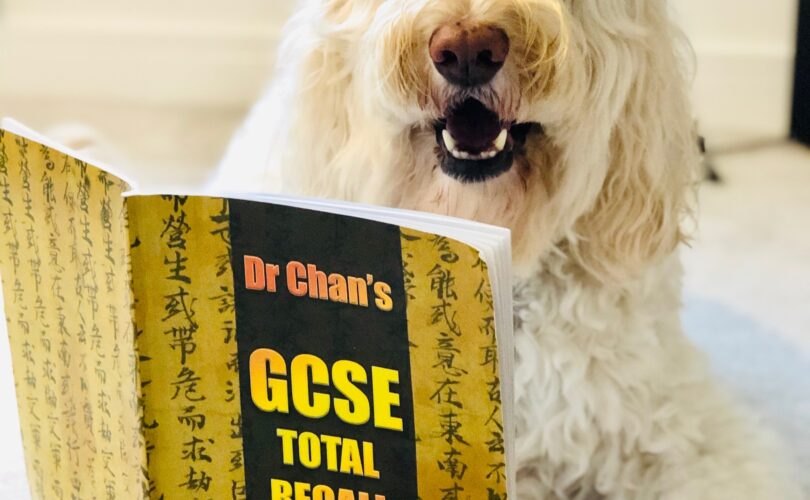
Dr Chan’s GCSE Total Recall System Review: Will It Help Your Child With Revision?
Will the Dr Chan’s GCSE Total Recall System revision guide help your child with revision?
Hi, I’m Julie, wife to Roy and mum to two daughters, so I know first-hand the struggles of balancing working life, running a home and still managing somehow to find some spare some to help your child get through GCSE revision.
That’s why I was so relieved when I finally found an alternative to relying on the more traditional rote learning methods to complete revision.
Some of these are covered in Dr Chan’s GCSE Total Recall System, which I will review for you today, warts-and-all.

Within my review of Dr Chan’s GCSE Total Recall System, I will cover…
- What you get
- What’s good
- What I feel could be better- I did say this would be a warts-and-all review!
So, with that said, let’s crack on! Switch off all distractions; grab a quick cuppa (and a biscuit) as I review Dr Chan’s GCSE Total Recall System.

Will the Methods Covered in dr Chan’s Manual Make Revision Easier for Your Child?
Well, that’s difficult for me to say without knowing your child. But what I can say is that the revision tips and tricks covered within this book (if applied correctly) are some of the best revision techniques I’ve ever come across- and I’ve come across many different ones, I can tell you!
Dr Chan’s Memory Tricks
I call them “tricks” because the memory techniques taught within this book are like “magic tricks”- you’ll be amazed by how powerful they are when applied to GCSE revision.
Dr Chan’s GCSE Total Recall System revision guide is not perfect, but then what is?
But what I can say, with confidence, is that it certainly reduced revision time and stress when I used it with my daughter for her revision, that’s for sure!
What You Get
Dr. Chan’s GCSE Total Recall System is a manual that focuses on powerful memory hacks. These hacks have been around for centuries and are rediscovered and shared in the book.
The book demonstrates how applying these memory techniques makes revision more manageable and QUICKER.
Furthermore…Once learnt, these memory techniques can be used for a lifetime, including for :
- A levels
- University degrees
- Or even for career advancement
You will discover how to:
- Cut revision time dramatically
- Store information in your long-term memory
- Make revision a LOT more fun!
And, that’s just a few of the reasons why the memory techniques shared within the Dr Chan’s GCSE Total Recall System book can help to transform how your child views revision FOREVER!
What Are Dr. Chan’s Credentials?
You are probably expecting me to say that he was a straight ‘A’ student, right?
Wrong.
To the contrary. He was actually a very poor scholar and was predicted to achieve just 3 mediocre ‘O’ levels (which was the equivalent of what we now call GCSE back in the day).
In fact, his teachers pretty much wrote him off in school, predicting that he would fail in most subjects, i.e., ungraded!
His saving grace turned out to be his love of magic and illusion. Applying this passion to his revision is what eventually led him to go on to achieve 7 decent ‘O’ level grades and to then go on to graduate in math and electronics, simply by applying some of his memory tricks to exams…
The same ones that successful memory champions also use.
He demonstrates how ANYONE can use these same memory tricks within his manual because like he so rightly points out:
“It’s much easier to take advice from someone who struggled but found a way through.”
What’s The Cost Of Dr Chan’s GCSE Total Recall System?
If you’re anything like me, the first thing that you’ll want to know is:
“How much does it cost?”
So rather than leaving you in suspense and running the risk of you skimming to the end and missing important stuff that I’m going to cover within my review, here’s the answer.
At the time of writing this review, Dr Chan’s GCSE Total Recall System costs a one-off charge of just £29.95 & postage and packing and comes with a 100% money-back guarantee...and includes FOUR special bonuses,which are:
✅ Pass GCSE Maths in Four Weeks EBook (value £25)
✅ The Best Way To Prepare For A Maths Exam EBook (value £5)
✅ GCSE/IGCSE Past Papers by Topic Ebook (value £15)
✅ Dr Chan’s Motivational Masterclass (value £25)
What’s Covered Within The Dr Chan’ GCSE Total Recall System?
Here’s what you’ll get.
- The Three Memory Systems
- Dr Chan’s Alphabet System
- Dr Chan’s Sequential Story Linking System
- Dr Chan’s Rooms Of The Mind System
- Appendix 1: How to remember dates
- Appendix 2: How to memorise a pack of playing cards
- BONUS MATERIAL: The Amazing Effects of Goal Setting
- Appendix 3: Resources
- Appendix 4: Seven Revision Study Hacks You Can Use To Boost Your Grades
All the above for this one-off price.
The manual is currently still being sold for a one-off price of £29.95, which I personally think is a bargain given how much stuff is included and how powerful the memory hacks actually are.
It is unclear how long this offer will actually continue, though (especially given that his sales page states that the price could soon DOUBLE), so I definitely recommend buying it while it’s still at this incredibly low price.
Ok, so we know how the manual is set out, and who created it…
So now let’s review Dr. Chan’s GCSE Total Recall in some more detail.

Dr. Chan’s training is easy to follow, and each memory hack is separated into short chapters so that it is easier to digest.
Each chapter is written in an entertaining manner with a font that is easy to read and illustrations that help to break up the content, making it easier to take in.
After a brief introduction, the memory hacks are explained in detail in separate chapters. Additionally, interesting bonus memory facts are randomly featured within each chapter.
The Three Memory Systems (5 pages)
In this chapter, Dr Chan provides a brief overview of the 3 main memory techniques that he covers within the manual…
These are the same ones that he was inspired to use within his own revision due to his love of magic tricks.
Dr Chan’s Alphabet System (21 pages)
This unique memory system involves coding each letter of the alphabet by linking them to an image, making remembering lists of information easier (and quicker).
Once learnt, this memory coding system can be used for a lifetime.
You will learn how to use your memory very much like a tape recorder- by taping lists of information into your memory and then re-taping them with new lists once you’ve finished with the previous ones.
There are also some tests for you to test yourself within this chapter.
This system is best used for information that you don’t need to remember long-term.
But the alphabet coding part (once learnt) can be applied to different lists, time after time.
Dr Chan’s Sequential Story Linking System (15 pages)
Within this chapter, he teaches a simple memory trick to use to remember numerous items or facts.
Unlike the Alphabet system, this memory technique can be used to store information long term, simply by storing the information in your long-term memory.
Rehearsing the information from time to time will prevent the information from fading.
This memory technique links relatively boring facts to more interesting and vibrant images, via a story, making them much easier to remember.
He provides actual examples of how to apply this revision technique to subjects like Science, Maths and History.
For example: He demonstrates how to use this method to learn 10 moons of Jupiter simply by creating a story and linking each moon into the story.
The first 3 moons are :
- Io
- Europa
- Gannymeade
Here’s how he then uses this memory method to link the first 3 examples into his story.
- IO is referred to as an IOU letter within the story.
- Europa becomes a map of Europe
- And Gannymeade is remembered as the Wizard Gandalf
It is fascinating how quickly this difficult (and boring) list becomes much easier to remember, once it is crafted into a story.
This technique is especially effective for learning paragraphs of information.
Dr. Chan’s Rooms of The Mind System (13 pages)
The Rooms of the Mind memory technique has been around for thousands of years and was widely used by the Romans.
It is an effective way of storing lots of facts across many subject areas and is a method often used by top memory champions and illusionists.
It is similar in some ways to the Alphabet system in that the facts that you want to remember are hung up to pre existing lists of objects.
How Is It Different To the Alphabet Memory Hack?
However, unlike the alphabet system, where the lists get wiped out after entering new information, the rooms of the mind system allow you to “record” much more information at one time.
It works by “furnishing” your rooms with objects and encoding them as a template for each room.
Like the Alphabet memory technique, you will need to code up your basic template initially. However, once you have memorized the code, it can be used forever!
Again, examples are given on how to apply this memory technique to subjects like physics, and psychology.
For example: Physics terms are remembered by attaching keywords to items in a room.
Here’s an example of how it works:
- A strand of human hair standing upright on a kitchen door handle to remember “static electricity“.
- Or a radio nailed to the door that is rotting away for “radio decaying“
And so on.
He also explains why using this memory trick can often be the difference between achieving a C and an A* grade at GCSE.
Appendix 1: How To Remember Dates (6 pages)
Just like it “says on the tin”, this chapter shares memory tips on easier ways to remember dates- as dates and number sequences tend to be more tricky to remember.
And as we’ve learnt from previous memory tips within the manual, images work really well when it comes to memorizing important information. And numbers are no different. Using images is just as effective for remembering dates and numbers.
One example given within this section is how to attach silly rhymes to remember numbers:
For example:
61 sounds like a sickly bun.
Using an image of a bun being sick is a much more effective way of remembering this number.
He then goes on to provide more examples of how to use this particular revision method to remember important dates, such as:
The battle of Trafalgar and the year that slavery was abolished.
The book goes on to demonstrate how to code numbers to create your very own memory system to remember important dates.
This chapter also covers how to apply a mini SSL (sequential story linking system), which he covered in a previous chapter, to remember dates.
Appendix 2: How to memorise a pack of playing cards (8 pages)
Ever wondered how memory champions and illusionists memorise packs of playing cards?
Surprisingly, it’s not because they have better memories than everyone else.
It’s simply because they have learnt how to efficiently use similar memory techniques that are covered within Dr Chan’s GCSE total recall system manual.
Within this chapter, Dr Chan unmasks the “secret” of how it’s actually done.
He demonstrates, step by step, how to use the revision techniques provided in this manual to learn a whole deck of cards so that you can have some fun impressing your family and friends!
Bonus Material: The Amazing Effects Of Goal Setting (11 pages)
This segment focuses on the importance of goal setting from a young age, including the wrong things and the right things to do when setting your goals.
Included are:
- Four effective goal-setting tips
- The 3 main keys to success
- Five goal setting myths
Appendix 3: Resources (1 page)
This outlines other resources available for expanding your knowledge of these types of memory techniques.
Appendix 4: Seven Revision Study Hacks You Can Use To Boost Your Grades ( 3 pages)
Again, this is self-explanatory and contains very useful tips for making revision easier, including creating drawings to remember material.
Dr. Chan’s GCSE Total Recall System- The Bits I Feel Could Be Better.
So, I’ve covered what’s good about the book, but nothing is perfect, so here are a few things that I think could be better with Dr Chan’s GCSE Total Recall System:
- We’ve all heard the saying: “Don’t judge a book by its cover” …

Well, in my opinion, this definitely applies to Dr. Chan’s GCSE Total Recall System manual.
Let’s face it- I think you’d agree that the cover of this manual isn’t exactly appealing to the eye. To be honest, I also think the title could be a bit more exciting.
In fact, my daughter’s first reaction when the book came was to say how plain the book cover was… which isn’t a great start when you’re trying to get a reluctant learner on board with revision!
I also personally think that there could have been a few more images included too.
However, the overall content of the book more than makes up for this, so I am willing to overlook this minor issue.
2. The initial coding part of some of the memory techniques can take a bit of time to learn and master. Therefore, I would strongly recommend doing this with your child and trying to make it as fun as possible. For example, be creative with your images, as it will make them a lot easier to remember.
3. I would like to see a Facebook Group created for people who have purchased the manual. This would create an opportunity to ask further questions and also for people to share tips and advice on how they have personally used and adapted the memory techniques within the book.
Dr Chan’s GCSE Total Recall System- What You Will Need To Do
Like most things in life, the revision techniques covered within this manual is a two-way process. Your child will get out, what they put in.
However, what I can confidently say is this…
If they invest the time needed to master the revision hacks featured within this book, then revision will be…
- Less time-consuming for YOU and your child, as your child will learn much quicker.
- More effective. The revision techniques can be used for a lifetime. Once mastered, they will be there for good! Simply rehearse them from time to time to keep the data stored effectively.
- A LOT more fun– for YOU and your child!
Conclusion
So, after reading my review of Dr Chan’s GCSE Total Recall System, the question is:
Should you buy the manual?
I can hand on heart say YES!
Because for a cost of just £29.95 & postage and packing, I can’t stress enough how much of a bargain it is…
Especially given that if you’re not happy with it, you can get your money back anyway…GUARANTEED.
You also receive four bonuses, including some of the products included in the Pass GCSE Maths in Four Weeks, which usually retails for £37.
As well as the price, I recommend Dr Chan’s manual for even more IMPORTANT reasons…
- It helps children of ANY ability and background to achieve better grades.
- Dr Chan is a great example of how a student predicted to achieve just 3 mediocre passes at O level (GCSE) actually went on to achieve 7 decent grades at GCSE as well as a degree; simply by applying his passion for magic and illusion into his studying.
- His manual is written in a way to help your child progress with their studies in a more fun and challenging way.
- There are heaps of examples demonstrating how each revision technique can be applied effectively to all subjects, including science, history and psychology.
- The information is easy to follow and understand, even for parents or pupils who struggle with revision.
- There are also some images included, which help to break up the text as well as appeal to visual learners.
- As well as the revision techniques, there are also LOTS of extra bonuses, including the How to Pass GCSE Maths in Four Weeks eBook, the most efficient ways to goal set and the best revision hacks to boost exam grades.
I could go on and on, but I’m sure that you get my drift.
As I stated earlier, there are a few things here and there that I would change, to make it even better, but they are minor when you take into account the amount of time and stress you will save simply by knowing these easier and quicker revision techniques covered within this manual..
I have been exploring alternative ways to revise for over a decade, and I have to say that Dr. Chan’s GCSE Total Recall System includes some of my absolute favourites.
I would highly recommend this manual to anyone seeking to reduce revision time (and boredom) and wanting to improve their child’s GCSE grades. The lesser-known revision methods covered within this book not only help to make revision more manageable but also make revision:
- More structured,
- Less time consuming
- And more FUN!
And once applied, they will be with you forever (with just a little rehearsal here and there).
If you’re ready to give the revision tips and techniques featured within Dr Chan’s GCSE Total Recall System manual a try [RISK-FREE]to make GCSE revision QUICKER and more fun for you and your child, simply click on the link below, to order:







